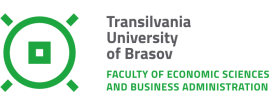Study programmes

The field of master’s degree studies in which this study programme falls is Business Administration. The duration of studies is 2 years (120 ECTS credits). Students acquire skills to make decisions in conditions of risk and uncertainty specific to business administration in tourism, to interpret the dynamics of the business environment in tourism and to capitalize on the results, creative application of research methods and techniques in analysis, interpretation and identification of solutions for specific situations in tourism, to use information technology and be aware of its possibilities to solve problems specific to the field. Completion of this study programme enables graduates to approach several professions in the field of tourism.
Perspectives after graduation: general manager, director and assimilated, tourism leaders, hospitality, food and leisure activities, specialists with administrative and commercial duties, economists, assistant lecturers, high school teachers, managers in tourism, small business leaders in tourism, hospitality, food and leisure activities.
- Curriculum
- Syllabus

The master’s degree programme is in the field of Management, with a duration of 2 years (120 ECTS credits). The master’s programme prepares graduates capable of leading public or private organizations, to make decisions aimed at carrying out complex projects in a dynamic economic environment, in which entrepreneurship and the ability to cope with risks, sustainable development, fast change and competition are increasingly valued.
Perspectives after graduation: manager, general manager, area manager, product manager, human resources manager, logistics manager, procurement manager, project manager, management analyst, quality system manager, risk management system manager, management consultant.
- Curriculum
- Syllabus

The master’s field which this study programme belongs to is Marketing. The duration of studies is 2 years (120 ECTS credits). Master’s students acquire skills for developing, evaluating and implementing marketing in complex business environments; in-depth analysis of a variety of concepts, theories, case studies, tools, techniques, tactics and trade and marketing models; knowledge of the structure and functions of marketing in general and of marketing policies and strategies in particular; ability to effectively organize professional activity.
Perspectives after graduation: economist in commerce and marketing; public relations specialist; media planner; designer of products for exhibitions; marketing planning specialist; product manager in the marketing structure of a corporation; global advertising / merchandising manager; event planner; marketing channel manager; online communication manager; specialist and logistics manager.
- Curriculum
- Syllabus

The programme addresses those who intend to deepen their knowledge of international economic relations so as to pursue a successful career in the field and to become more familiar with the multitude of strategic decisions pertaining to the international business environment. The development of skills for using a range of analytical tools for specific decision-making in market economy conditions are ensured. The duration of studies is 2 years (120 ECTS credits).
Perspectives after graduation: graduates of the programme can be employed in multinational companies, in small and medium Romanian and foreign companies, can set up their own business and can work in fields such as customer relations, logistics, procurement, public relations, etc.
- Curriculum
- Syllabus

The master’s degree field in which this study programme falls is Finance. The duration of studies is 2 years (120 ECTS credits). Master’s students acquire skills in using models and techniques of the financial-banking area to analyse the financial and stock market performance of companies, as well as the operation of banking companies. Completion of this study programme enables graduates to approach several professions in the field of finance and banking.
Perspectives after graduation: financial director, financial controller, financial-banking system specialist, researcher and research assistant in finance and banking, bank executor, tax expert, risk control specialists, investment analyst, credit administrator, budget consultant.
- Curriculum
- Syllabus

The field of master’s studies in which this study program falls is Accounting. The duration of studies is 2 years (120 ECTS credits). Within the programme there are two specialization routes: route 1 - Accounting policies; route 2 - Accounting, audit and management control. Those who choose route 2 can benefit from the equivalence of the internship entrance exam according to the agreement concluded with CECCAR. The disciplines in the curriculum ensure the acquisition of theoretical knowledge, as well as experience and an ethical attitude appropriate for a professional career in the field of accounting, auditing and management control.
Perspectives after graduation: chief accountant, tax expert, financial analyst for route 1 graduates; head of financial service – accounting departments, researcher in management, accounting and financial control, management controller for route 2 graduates.
- Curriculum
- Syllabus

The master’s field in which this study programme integrates is Cybernetics, Statistics and Economic Informatics. The duration of studies is 2 years (120 ECTS credits). Students acquire skills related to the analysis, design, implementation of integrated information systems, forecasting and simulation of economic processes and phenomena and the use of decision-support IT products, design and execution of an audit and consulting in the field of ERP systems, development and use of modern entrepreneurial strategies in the field of information technology for business. Completion of this study programme enables graduates to approach several professions in the IT field.
Perspectives after graduation: ERP consultant, CRM, SCM, IT consultant, IT project manager, programmer, integrated IT systems analyst, data warehousing and business intelligence systems development, data mining application development, IT systems designer, design and administration databases, testing of IT applications (Quality Assurance), implementation and operation of integrated commercial and open-source IT systems.
- Curriculum
- Syllabus



